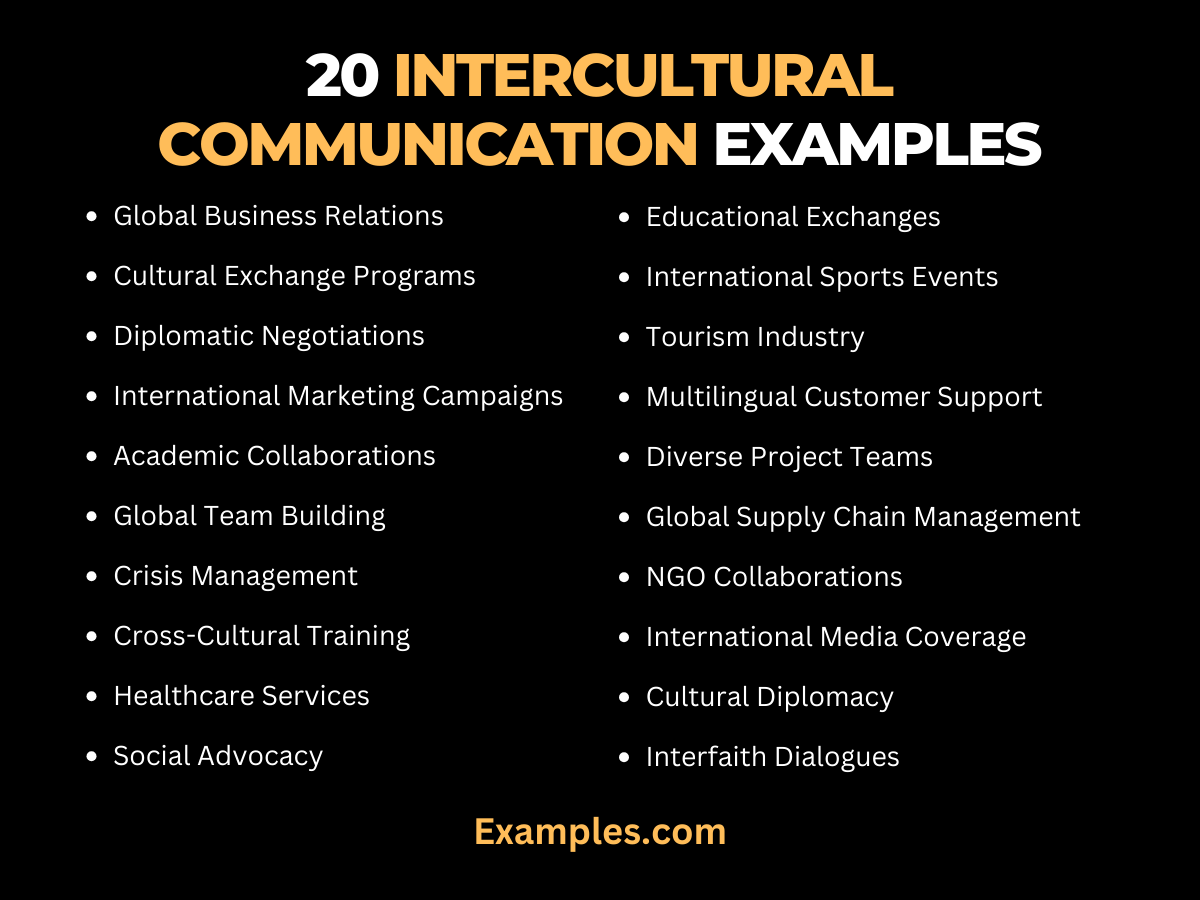19+ Benefits and Uses of Intercultural Communication Examples
Embark on a cultural journey with our comprehensive guide on the benefits and uses of intercultural communication. This guide is more than words; it’s a roadmap to fostering global understanding. Dive into illuminating communication examples that showcase the power of bridging cultural gaps. Uncover the advantages, practical applications, and real-world tips that will empower you to navigate a diverse world with confidence and cultural finesse. Get ready to enhance your communication toolkit and embrace the richness of cross-cultural connections.
20 Intercultural Communication Examples
Embark on a transformative journey through the 20 benefits and uses of intercultural communication. Uncover the power of global connection with real-world examples, enhancing your communication skills. Explore this guide to embrace the richness of cultural diversity, fostering understanding and collaboration.

- Global Business Relations: In a multinational team, clear intercultural communication ensures smooth collaboration and effective project outcomes.
- Cultural Exchange Programs: Participation in international exchange programs promotes cross-cultural understanding and enriches personal perspectives.
- Diplomatic Negotiations: In diplomatic talks, intercultural communication fosters mutual respect, easing negotiations and promoting peaceful resolutions.
- International Marketing Campaigns: Crafting culturally sensitive marketing messages ensures broader audience engagement and market penetration.
- Academic Collaborations: Interdisciplinary research thrives on intercultural communication, bringing diverse perspectives to the academic table.
- Global Team Building: In multinational corporations, intercultural communication is key to building cohesive and productive global teams.
- Crisis Management: During international crises, effective intercultural communication aids in coordinating responses and resources.
- Cross-Cultural Training: Companies provide cross-cultural training to employees for enhanced communication and understanding in diverse workplaces.
- Healthcare Services: In healthcare, culturally competent communication ensures accurate diagnosis and patient satisfaction.
- Social Advocacy: Advocacy for global issues benefits from intercultural communication, fostering international support and collaboration.
- Educational Exchanges: Student exchanges cultivate global citizens by exposing them to different cultures and learning environments.
- International Sports Events: In sports, effective intercultural communication among athletes and teams ensures seamless competition and camaraderie.
- Tourism Industry: In the tourism sector, understanding diverse cultures is crucial for delivering exceptional customer service.
- Multilingual Customer Support: Companies offering multilingual support enhance customer satisfaction and loyalty.
- Diverse Project Teams: Forming project teams with members from various cultures brings a wealth of ideas and perspectives.
- Global Supply Chain Management: Intercultural communication streamlines global supply chains, ensuring efficient operations.
- NGO Collaborations: Non-profit organizations benefit from intercultural communication to address global issues collectively.
- International Media Coverage: Media outlets engage diverse audiences by incorporating intercultural perspectives in reporting.
- Cultural Diplomacy: Governments employ cultural diplomacy to strengthen international relations and global influence.
- Interfaith Dialogues: In promoting interfaith harmony, effective intercultural communication fosters understanding and tolerance.
Benefits of Intercultural Communication
Embarking on the journey of intercultural communication opens a gateway to numerous advantages. This comprehensive guide explores the multifaceted benefits, delving into how this form of communication enriches personal, professional, and societal interactions.

- Understanding Cultural Diversity
Intercultural communication fosters an appreciation for diverse perspectives, promoting cultural sensitivity and understanding. By embracing differences, individuals develop a broader worldview, breaking down stereotypes and prejudices. - Enhanced Global Collaboration
In an interconnected world, the ability to communicate across cultures is essential. Intercultural communication facilitates collaboration on a global scale, whether in business, academia, or diplomacy, fostering innovation and mutual growth. - Conflict Resolution and Peacebuilding
Cultural differences can lead to misunderstandings and conflicts. Intercultural communication equips individuals with the skills to navigate these challenges, fostering conflict resolution and contributing to global peacebuilding efforts. - Personal Growth and Development
Engaging with different cultures nurtures personal growth by challenging preconceptions and expanding one’s comfort zone. Individuals develop adaptability, resilience, and an openness to new ideas, contributing to their overall development. - Building Inclusive Communities
Intercultural communication promotes inclusivity within communities. By acknowledging and celebrating diverse cultural backgrounds, communities become more vibrant, cohesive, and welcoming to people from various walks of life.
Uses of Intercultural Communication
Intercultural communication serves as a versatile tool with applications across various domains. This section explores the practical uses, shedding light on how individuals and organizations leverage intercultural communication for positive outcomes.
- Global Business Success
In the business world, intercultural communication is crucial for global success. It facilitates effective negotiation, marketing, and collaboration with partners and clients from diverse cultural backgrounds, leading to improved business outcomes. - Effective Diplomacy and International Relations
Diplomacy relies heavily on effective communication. Intercultural communication skills are vital for diplomats and international relations professionals to navigate negotiations, treaties, and collaborations across borders. - Cultural Exchange and Education
Intercultural communication plays a pivotal role in cultural exchange programs and educational initiatives. It fosters an environment where students and participants can learn from and about different cultures, promoting a more interconnected world. - Promoting Social Advocacy
Individuals and organizations use intercultural communication to advocate for social causes on a global scale. By effectively communicating across cultures, advocates can raise awareness, build alliances, and address pressing global issues. - Enhanced Healthcare Delivery
In healthcare, intercultural communication is vital for understanding diverse patient needs, beliefs, and practices. It ensures that healthcare providers can deliver culturally competent and sensitive services, improving overall patient outcomes.
In conclusion, this comprehensive guide has unveiled the myriad benefits and diverse applications of intercultural communication. From fostering personal growth and global collaboration to promoting inclusivity and resolving conflicts, its impact is far-reaching. Armed with insights and real-world examples, embrace the power of intercultural communication for a more connected, understanding, and harmonious world.



